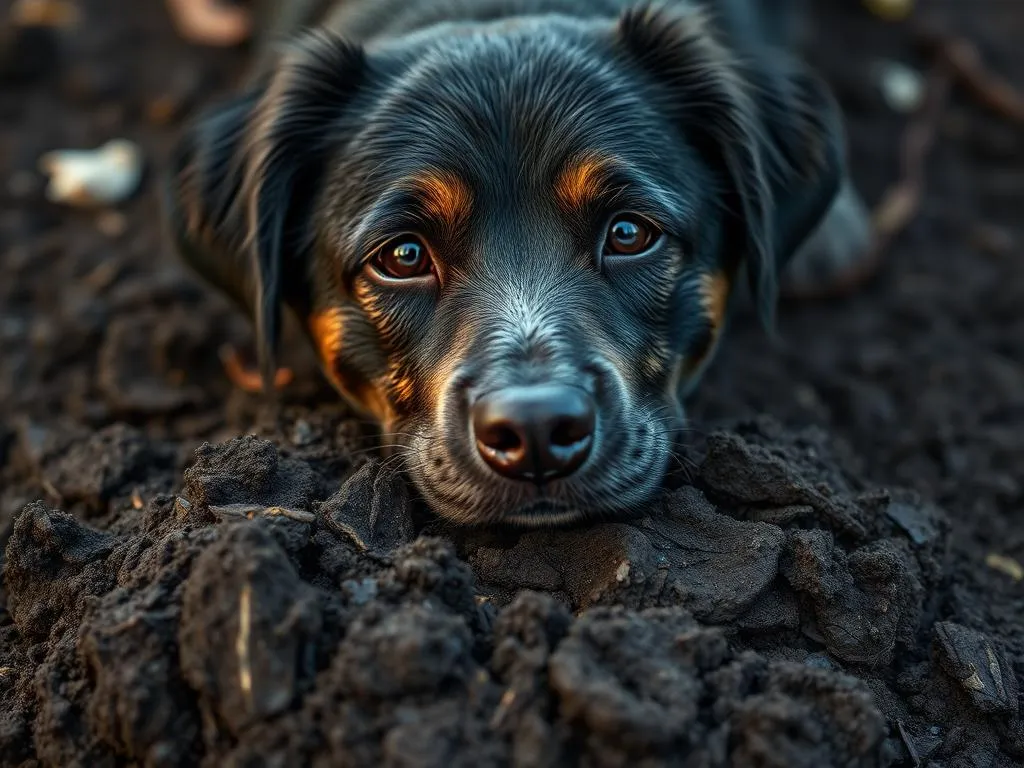
Monitoring your dog’s health can often begin with something as simple as observing their poop. While it may not be the most glamorous topic, black dog poop can provide crucial insights into your pet’s well-being. The color, consistency, and frequency of your dog’s feces can reveal a lot about their health status. Understanding what black dog poop indicates and when you should be concerned can help keep your furry friend healthy and happy.
The Basics of Dog Poop
What Dog Poop Can Tell You
Dog poop is one of the most direct indicators of your dog’s health. Changes in your dog’s feces can signal dietary issues, digestive problems, or even serious health concerns. Observing the characteristics of your dog’s poop can help you identify potential issues early on, making it easier for your veterinarian to diagnose and treat.
Normal Dog Poop Characteristics
Normal dog poop is typically brown and has a firm, log-like shape. However, variations in color, texture, and frequency can occur based on diet and health. Here are some key characteristics of healthy dog poop:
- Color: While brown is standard, colors can vary. Green or yellow poop may indicate dietary issues, while black or red can signal more serious conditions.
- Texture: Healthy poop should be firm but not hard. Soft, mushy, or watery stools can indicate digestive upset.
- Frequency: Most dogs will poop between one to three times a day. Changes in frequency can indicate health issues.
What Does Black Dog Poop Indicate?
Causes of Black Dog Poop
Seeing black dog poop can be alarming for any pet owner. Understanding the potential causes can help you determine whether the situation is serious or not.
-
Dietary Factors: Certain foods can lead to darker stools. For instance, a diet high in meats, particularly organ meats, or foods with artificial dyes may cause black stools. If you’ve recently changed your dog’s diet, this could be a simple explanation.
-
Medical Issues: Black poop can also indicate gastrointestinal bleeding. This could stem from various issues, including ulcers, tumors, or ingestion of foreign objects. If your dog has been acting lethargic or has other symptoms, it’s essential to seek veterinary attention.
-
Medications and Supplements: Some medications, particularly iron supplements, can darken stool color. If your dog is on medication, consult your vet about potential side effects.
Differentiating Between Harmless and Serious Causes
While black dog poop can result from benign dietary changes, it can also indicate serious health problems. Look for accompanying signs, such as:
- Vomiting: If your dog is vomiting along with black poop, it may indicate a more severe issue.
- Lethargy: Excessive tiredness or lack of interest in activities may be a red flag.
- Appetite Changes: A sudden change in appetite can also signal health problems.
If you observe any of these symptoms alongside black dog poop, it’s time to consult your veterinarian.
When to Consult a Veterinarian
Recognizing Urgent Symptoms
Certain symptoms require immediate veterinary attention. If your dog exhibits any of the following, do not hesitate to seek help:
- Blood in Stool: If you see bright red or dark, tarry stools, this could indicate bleeding in the gastrointestinal tract.
- Severe Lethargy: If your dog is unusually inactive or unresponsive, it could be a sign of a serious health issue.
- Persistent Vomiting: Frequent vomiting, especially when combined with black poop, necessitates a vet visit.
Preparing for Your Vet Visit
When preparing to visit the vet, gather relevant information to help them diagnose your dog’s condition. Consider the following:
- Dietary Changes: Note any recent changes in your dog’s diet or new treats.
- Duration of Symptoms: How long has your dog been experiencing changes in their poop?
- Behavioral Changes: Keep track of any changes in behavior, appetite, or energy levels.
Common Diagnostic Tests
Your veterinarian may perform several tests to determine the cause of black dog poop. Common diagnostic procedures include:
- Blood Tests: A complete blood count can help identify infections or other health issues.
- Fecal Exams: A fecal test can check for parasites or bacteria that may be causing digestive upset.
- X-rays: These can help visualize any foreign objects or abnormalities in the digestive tract.
Prevention and Management
Maintaining a Healthy Diet
One of the best ways to ensure your dog’s digestive health is to provide a balanced diet. Here’s what you can do:
- Choose Quality Dog Food: Select high-quality dog food that meets your pet’s nutritional needs. Look for brands that list meat as the first ingredient.
- Avoid Table Scraps: Human food can upset your dog’s stomach and lead to changes in poop color and consistency.
- Monitor Treats: Be cautious with treats that may contain artificial dyes or ingredients that can affect stool color.
Regular Health Check-Ups
Routine veterinary visits play a crucial role in maintaining your dog’s health. Regular check-ups can help catch potential issues early. Ensure your dog is up to date on vaccinations and deworming schedules, as these can significantly impact overall health.
Home Care and Monitoring
Monitoring your dog’s poop can be as simple as keeping a poop diary. Note any changes in color, consistency, and frequency. This record can be invaluable when discussing your dog’s health with your veterinarian.
Here are some tips on how to effectively monitor your dog’s poop:
- Daily Checks: Make it a habit to check your dog’s poop daily to spot any changes early.
- Visual Documentation: If you notice any changes, consider taking a photo to share with your vet.
- Track Diet Changes: Keep a log of what your dog eats to correlate with any changes in stool.
FAQs About Black Dog Poop
Common Questions Dog Owners Ask
What if my dog has black poop after eating certain foods?
If you notice black dog poop following a dietary change, it may be harmless. However, monitor for other symptoms, and consult your vet if the issue persists.
Can black dog poop resolve on its own?
In some cases, if the cause is dietary, it may resolve once the diet is normalized. However, if there are additional concerning symptoms, it’s best to consult a vet.
Is it safe to treat myself at home or should I always consult a vet?
While some minor issues can be managed at home, it’s always safer to consult your veterinarian if you’re unsure, especially with black dog poop, which can indicate serious health concerns.
Expert Answers
- Dietary causes can often be remedied by reverting to a previous diet or choosing a more balanced option.
- Black dog poop that persists beyond 24 hours should prompt a vet visit, especially in conjunction with other symptoms.
- Always prioritize your dog’s health and err on the side of caution when it comes to changes in their poop.
Conclusion
Understanding your dog’s poop can be a window into their overall health. Black dog poop can be a warning sign of dietary issues or more severe health problems. By staying observant and proactive, you can help ensure your furry friend remains healthy. If you notice concerning changes in your dog’s stool, don’t hesitate to contact your veterinarian for guidance. A healthy dog often starts with a watchful eye on their poop!









